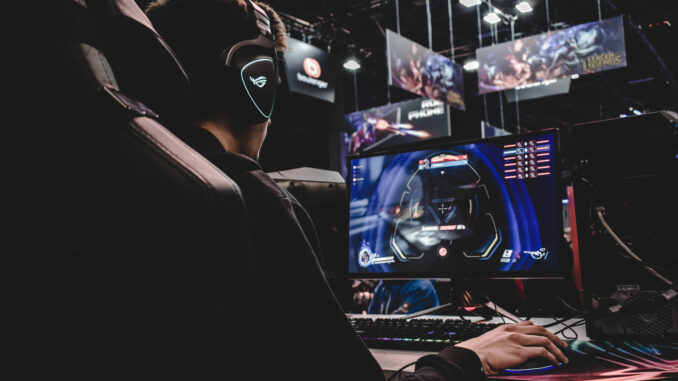
Christiana Cates | Staff Columnist
Sept. 2, 2021
The realm of esports has evolved dramatically, especially within this last decade, but many are faced with the question of whether or not it truly qualifies as a sport.
Esports involves groups of young men or women who are drafted on a team to play video games professionally based on skill and popularity. In professional sports, a team of people are drafted based on experience, talent and sometimes popularity.
Esports players can play console or on a PC, using a controller or mouse and keyboard in front of a monitor or TV. This does not rely on physical exertion or athleticism. Any individual can qualify.
Professional sports require athleticism factoring in genetics, height, weight and muscle mass. And that reasoning is where esports is disqualified.
The “e” in esports provides a clear barrier that it is not a sport, but rather electronic sports. It involves digital efforts with no physical attributes being a factor in the process of recruitment.
When looking at the most popular esports team, FaZe Clan, we see the patterns of recruitment and qualifications it takes to make the roster.
Even with these similarities, the argument boils down to the activity of an esports player versus a professional athlete.
FaZe Clan, owned by FaZe Temperrr (Thomas Oliveira) and nine other members, posted recruitment videos alongside their management team.
In September 2020, FaZe Clan posted on all active social media platforms: Twitter, YouTube and Instagram their Faze5 open recruitment challenge.
FaZe Clan recruitment is based on many different qualifications, such as player montages by competing members like: FaZe Qwidt and FaZe H1ghSky1, or even celebrity status. In the past couple of years FaZe has started recruiting celebrities like Bronny James and Ben Simmons due to its ever changing brand.
Looking at another esports team, Cloud9, we see a more strict team recruitment process. According to the Cloud9 website (cloud9.gg) you have the option of undergoing training to hone your skills through the Training Grounds program, which includes paid packages of four-week training initiatives, one-on-one review, and a curriculum taught by certified esports coaches.
Esports teams have owners and captains; captains can take their teams into championships and win large sums of money in competitions.
Over the years the most useful way of recruiting a player for a specific game is to see their player montage. This is what FaZe Clan, Cloud9 and Optic Gaming all have used to see a player’s skills.
The montages vary from game to game showing cool tricks and shots made in the Call of Duty franchise or another franchise.
This comparison evidently shows that esports is not a sport, based on that recruitment is contingent upon if they can play a virtual game well enough.
Optic Gaming, formerly run by Nadeshot (Matthew Haag), is a prime example of an esports team that sticks to its recruitment roots.
Optic may have tougher recruitment, as it is marketed just for its esports, considering it was once a fierce competitor against FaZe.
When looking at professional sports, an athlete usually is trained from a young age into adulthood to reach the top level of a sport, the professional leagues. If we take football, a child may start playing at 10-years-old or younger in their school program, continuing through junior high school and high school.
The school years of playing advance, then are determined by a college scholarship to play in college sports. From college sports then players go into a draft, which involves rigorous workouts based on position.
Whether it’s a long jump, running a QB to wide receiver drill or running and measuring that time, all of these require years of adequate physical training from youth into adulthood.
Esports is incredible, and as a FaZe Clan fan since 2015, it is an impressive league. But the hard work and rigorous physical endurance that a professional sport requires is not there.
The qualifications are much less rigorous, and unlike sports, in which a game can thwart a whole season, in esports you are given multiple opportunities to compete at the highest level in different tournaments.
There is evidence disproving it as a sport. But ultimately it is up to the individual as to whether it qualifies as a sport.




